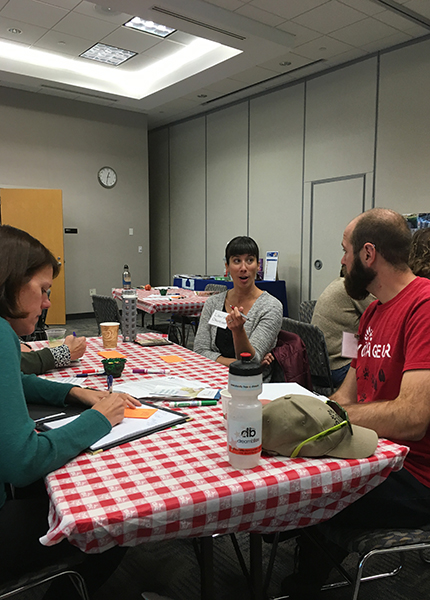Tips for talking about climate change

One important barrier to taking more collective action on climate change is an informal agreement we seem to have made in society to not talk about the issue.
The reality that most people are concerned about climate change but don’t commonly talk about it with people they know is referred to as “climate silence.”
Not talking about climate change leads to a perception that caring about and taking action on climate issues is not a social norm. Increasing public discourse is important because people are more likely to act on something if they think it aligns with their identity and is supported by people and groups they associate with.
Why we don't talk about climate change
Climate silence occurs for many reasons. People may think climate change is too politically divisive or that they don’t know enough about the issue.
They may think that climate change is too overwhelming, distant, frightening, or uncomfortable to talk about. And many people may not realize that simply talking about climate change can be an important step toward addressing the problem.
There is ample opportunity to increase dialogue about climate change in Hennepin County. According to the Yale Climate Opinion maps, only 44% of Hennepin County residents say they discuss global warming at least occasionally, and only 31% hear news about global warming in the media at least once a week.
Tips for having climate conversations

Conversations are important. They promote social change, develop social norms, and can be deeply influential to the people involved.
When starting conversations on climate change, remember that most people are concerned about the issue, and you may find more areas of agreement than you expect.
Finding commons interests and areas of concern, speaking to shared values, and connecting to what people care about – hobbies, family, faith, community, jobs, etc. — are the important foundations of effective climate conversations.
Having an impactful conversation does not require a deep understanding of climate science. In addition to finding connection, emphasizing the scientific consensus (that 97% of climate scientists have concluded that human-caused climate change is happening) and the benefits of climate action are important in climate conversations.
Maintain realistic expectations for your climate conversations. Many constructive conversations will be brief and surface level. Small conversations are part of building momentum for change, breaking the climate silence, and moving people closer to a position where they participate in the global effort to reduce emissions.
REAL TALK principles for effective climate conversations
The #TalkingClimate Handbook, from by the UK-based organization Climate Outreach, developed the following principles for having effective climate change conversations. These were developed from a citizen science project involving over 550 people from 50 countries.
- Respect your conversational partner and find common ground: Seek common ground and shared values. Focus on building trust, not on having an argument.
- Enjoy the conversation: Avoid trying to fit in every point. Ask questions rather than lecture and seek to understand experiences that led to beliefs. Try to end on a positive note.
- Ask questions: Find out what climate change means to them. Give space for reflection.
- Listen and show you’ve heard: Genuinely listen and verify that you’ve correctly understood.
- Tell your story: How you became engaged and why you are concerned are some of the most powerful tools you have. Share your perspectives and experiences and where you are struggling or what challenges you have faced.
- Action makes it easier, but doesn’t fix it: Talking about actions you are taking to address climate change gives you a place to start the conversation and can help you be a role model. Emphasize how your actions are realistic and doable. Acknowledge that it can feel overwhelming, and everyone needs to find actions that work for them.
- Learn from the conversation: Every conversation is an opportunity to gain insights and improve. Don’t assume people won’t care — you may be surprised by what they say.
- Keep going and stay connected: Every conversation is valuable and challenges the perception that no one cares. Keep having conversations and connecting with others who are talking about climate.


